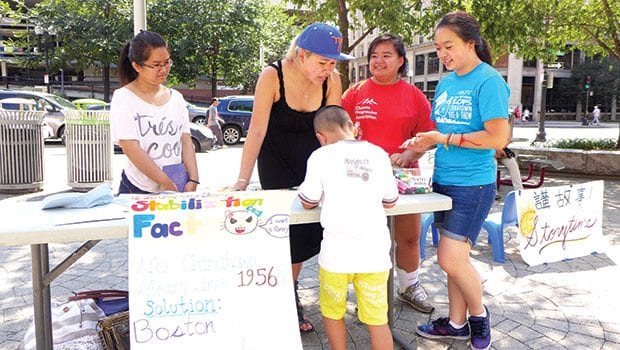Chinese Youth Initiative’s ‘Aim to Reclaim’ event offers sampling of library’s value to Chinatown
Decades-long battle to return public library branch to neighborhood

On the plaza outside the Chinatown gate on Monday, the Chinese Youth Initiative of the Chinese Progressive Association hosted children’s story times and offered books to borrow, giving passersby a taste of what a library could offer. The event, called “AIM TO RECLAIM: The Chinatown Library Campaign,” is the latest step in the decades-long battle to return a public library branch to the neighborhood.
In 1956, the city demolished Chinatown’s public library branch to make room for constructing the Central Artery. Chinatown remains the only Boston neighborhood without a library, forcing residents to trek to the Copley branch or do without.
“People can’t always pay for a T pass to go there [Copley],” said Sabrina Ng, who will be a senior at Newton North and helped run the event. Ng is a youth intern with the CPA.
During Monday’s display, CYI members manned a booth with handouts and bookmarks held storytelling on a blanket, and set out a shelf of books that attendees could browse and read. At a designated kids table, CYI members gave children activity books created especially for the event; the books told the story behind the library’s loss.
Filling a gap
Over the years, Chinatown has made several unsuccessful attempts to establish a library. In 2009-2010, Archstone real estate company donated a vacant storefront to then-Chinatown residents Leslie and Sam Davol for use as a temporary library. The place became known as the Chinatown Storefront Library and housed 5,000 book donated books. In 2012, the Chinatown Cultural Center Committee created the Chinatown Lantern Cultural and Education Center inside the Oak Terrace apartment complex. The Center offers 8,000 books and magazines.
Having seen the popularity of temporary libraries like these, Kim Situ, a Youth Coordinator with the CPA, said she is convinced that many people would use a permanent one.
The Chinatown Lantern Cultural and Education Center is still running, but Ng explained that its limited size in terms of both books and space and its early closing hours made it “not an ideal real library for us.”
“I think it’s mostly for residents who live there in Oak Terrace,” she added.
What would constitute an ideal library? The CYI conducted a series of focus groups to determine that. During the past year, they asked a group of their own youths, youths from Boston Chinatown Neighborhood Center, parents, and two groups of elderly members about their visions for a Chinatown library branch. Findings were presented at a June meeting attended by several city officials.
Parents and elderly focus group members expressed particular interest in bilingual computer classes and cultural activities. Youths highlighted the value of a library in providing job and college search resources. Other activities and potential library rooms that drew interest were adult ESL classes, a children’s room, homework help, a Chinese cultural/historical area, and a computer lounge.
“In particular in a neighborhood as dense as Chinatown is, and with limited community and green space, public space, a library is more than a space to get books,” said Situ.
Public space also is scarce. Places like the plaza where the event was held become unusable in the winter, and though bakeries and cafes offer potential meeting spots, Situ said there are few locations in the neighborhood where people can have quiet time or gather without having to buy something.
The chief obstacles facing the Chinatown library proposal: funding and a location.
For the past several years, the Boston Public Library, the city, and the CPA have been in discussion. A feasibility study for a library branch was conducted in 2007. This year, the groups have explored solving the limited space problem by locating the library in a “mixed-use” facility. “Mixed-use” means designating a library area within a building that is used for other purposes, such as housing or offices.
Stable funding
Among the locations being considered, Situ says the China Trade Center building “is the most ideal right now” because of the accessibility to the nearby Chinatown train stop and its proximity to areas like the theater district as well as “multiple neighborhoods and communities.”
The Aim to Reclaim event distributed petition letters addressed to Brian Golden, director of the Boston Redevelopment Authority, that attendees could sign and mail. The letters acknowledged the scarcity of public land and asked that Golden develop the China Trade Center “for community priorities to stabilize Chinatown’s future.”
The groups aim to make the library part of the existing, city-funded BPL system. In past years, such plans for Chinatown were stalled as the BPL faced reduced funding and considered closing branches.
“Funding was just hard to find for libraries,” said Situ.
The hope is that circumstances have now sufficiently changed.
“The mayor promised in 2013 that this [the library] would be a priority for Chinatown,” Situ noted, “So we really hope to see this.” Ng said that during his campaign in 2013, Mayor Walsh had signed a petition board and promised to work to get a library within the 2015 fiscal year.
Chinatown currently is undergoing many changes as luxury buildings are being developed and many families are finding they need to move out of the neighborhood, said Situ. Creating the library would “show [the city] really cares about Chinatown and investing in Chinatown.” She added that a multigenerational resource like the library would “be an anchor for the community.”
Situ said she would like to have a follow-up feasibility study on the China Trade Center as the library location. Monday’s goal, though, was to use the temporary library to emphasize what such a resource could offer the community.
The CYI members debriefed on Tuesday and held a longer temporary library day Wednesday, from 10:30am-3:30pm.






